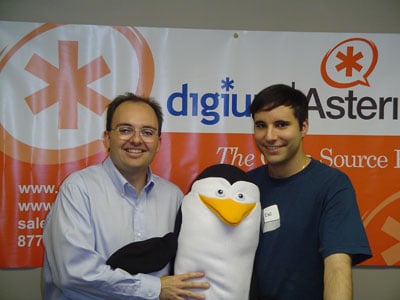
Tom Keating with Asterisk founder & Digium's Chairman and CTO Mark Spencer
(picture: Sept. 2005 at Digium's former HQ)
With all the Switchvox news, it would seem to me that Digium is heavily investing in the Switchvox technology. But to find out the truth about the past, the present, and the future direction of Digium, there's no better person to ask than Mark Spencer himself. So without further adieu, here's an interesting Q&A interview I had with him.
1) What is the biggest surprise you've seen in the Asterisk movement. It can be a weird Asterisk application you wouldn't expect or surprise at the number of Asterisk fans or something else you just didn't expect - it could even be something 'negative' but you're willing to share.
A couple of years ago, a group of Asterisk users from around the world chipped in to buy me a hot tub and magically I managed not to know about it. It was truly amazing! In terms of the applications, there are always new surprises. I recently learned that the Bishop of Bilbao's office uses Asterisk and is considering doing an IVR for people to receive some sort of recommended penance for their sins.
2) If you could go back in time, is there anything you would do differently? For instance, didn't you change buildings a few times? Perhaps buying a bigger building once - to save the hassle of moving all those Linux servers and IP phones multiple times?

We have definitely had to move a number of times, but it's hard to look back and see if there's anything we should have done differently because sometimes even the things you think were the wrong things to do sometimes turn out better. My mentor Mark Smith, for example, used to say that the two luckiest things that ever happened to him were that he couldn't get anyone to invest in UDS (his first company) and that he was forced to hold onto his Motorola stock for 7 years after it was acquired!
3) What improvements would you personally like to see in any upcoming releases? Perhaps Active Directory or LDAP integration?
LDAP, Clustering Events, and Video are three areas I'm especially interested in in terms of the core of the software. I'm also interested in ways to make Asterisk even more approachable for new developers of either core functionality or new systems utilizing Asterisk.


4) Back in September of last year, Digium acquired Switchvox. Tell me a little bit how the Switchvox acquisition has benefited Digium.
Switchvox has helped Digium offer a more feature rich turn-key SMB product for those seeking an IP PBX per-se. Clearly Switchvox has a lot of functionality that goes far above and beyond just Asterisk in terms of its organization, configurability, usability and integration with Web 2.0. Switchvox as a product is also ready for the traditional telephony channel, meaning a lot of growth into markets that otherwise would not have been easily served by Asterisk.
5) You mentioned in my interview in September that you would be to migrate Switchvox's technologies into Asterisk and be open source. Is that still your plans and if so what sort of time-frame?
The plan was to migrate technology from Switchvox to Asterisk. This process is moving ahead rapidly, and we expect Switchvox to be running on unmodified Asterisk within a few more releases.
6) I'm a big fan of Digium and Asterisk and would like to see Digium succeed. As you know, a lot of your competitors have taken the open source Asterisk code, tweaked it, add their own front-end, perhaps even added their own proprietary code and then re-sold it. There isn't necessarily a ton of value added by some of these third party Asterisk distros. My question to you is has Asterisk considered the SugarCRM/MySQL/Movable Type model where they offer an open source version that is 100% open source, but these companies also offer advanced versions with more complex features that is a "paid" version that includes code that is not GPL/open source. You can't get these advanced features in the open source version. Additionally you get product support with the paid versions. This is similar to what you've done with Asterisk Business Edition, which does add product support, but it's pretty much the same codebase/feature-set as the open source version.
Asterisk is and always will be fully Open Source. As you know, the Business Edition contains no code that is not available in Open Source (other than the copy protection obviously), but there is not necessarily a single Open Source version that directly corresponds to a BE release. Digium is committed to Asterisk remaining Open Source, as that is perhaps its single most fundamental reason for success, and the community needs that confidence. At the same time, Digium has acquired Switchvox, a product which utilizes Asterisk but is not itself Open Source and does not currently have plans to open source that product specifically. Digium's model is to leverage Open Source, and Asterisk in particular as our engine, to deliver products to targeted markets. Looking at something like Switchvox though, it is an application based on Asterisk as a stand alone PBX product with a world class user interface that happens to use Asterisk under the hood thus passing on the cost-benefits to the users. The Asterisk-GUI and AsteriskNOW, however are really open source Asterisk with nice packaging and are free of charge.
7) I can envision Digium offering something called Asterisk Advanced or Asterisk Premium. One set of advanced features people are looking for is unified communications (UC) that integrates voicemail, email, fax, TTS, presence, IM, video conferencing, collaboration, CRM, etc. Currently, only Microsoft OCS 2007 and Cisco offer comprehensive UC solutions but they are cost prohibitive for the SMB market. I think a low-cost Asterisk unified communications solution is a perfect opportunity for Digium. Thus, perhaps something called Asterisk UC Edition might be a good name. Your thoughts on this idea?
While Digium does enable companies to provide proprietary products to Asterisk through the dual license, we want the core of Asterisk to remain Open Source and as such encourage the development of Open Source technologies wherever possible. I believe it would be foolish to attempt to make Asterisk's innovation only available as a proprietary product when clearly it is its Open Source foundation that made it so successful and continues to do so, in spite of emotional and to a lesser degree business challenges imposed by people who leverage my work without contributing -- and in some cases directly attacking the very company that makes it possible for them to succeed. As for creating and naming future versions of Asterisk from Digium, I'll leave the product strategy to Product Management and the naming to Marketing but thanks for your suggestions.
[end interview]
Mark didn't take my idea of offering a "premium" UC (closed) version of Asterisk, that I felt would give Digium a potentially strong revenue source, I found it very fascinating that Mark continues to hold the "open source" mantra flag high. This only re-confirms Mark's (& Digium's) strong commitment to keeping Asterisk 100% open source that Mark stressed to me when I interviewed him & Bill Miller this past September. It's certainly a challenge having a business model based on open source. For instance, suppose Digium spends tons of money on R&D and paying programmers to develop complex unified communications functionality, how do they prevent third parties from simply taking that research & open source code and then re-selling it as their own?
I have to commend Digium for sticking to their 100% open source guns, but honestly, I don't think anyone would begrudge them if they copied the SugarCRM/MySQL/Movable Type model where they offered an open source version and a premium (closed) version. Ok, maybe some open source zealots would.
The Asterisk community and the motley of companies that have built solutions around the open source Asterisk platform have Digium to thank for continuing to offer a 100% open source platform. Should Digium ever decide to take the dual open source & closed source route, that will be an earth-shattering event that will change Asterisk forever. Whether that's good or bad I leave you the reader to decide.












